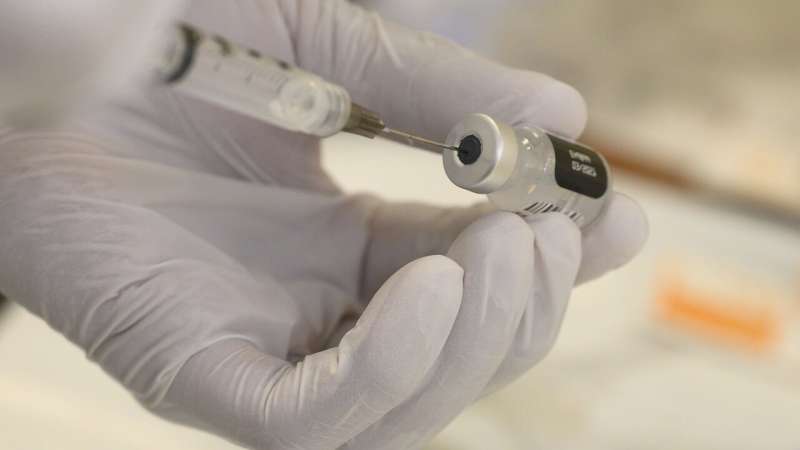This article has been reviewed according to Science X's editorial process and policies. Editors have highlighted the following attributes while ensuring the content's credibility:
fact-checked
peer-reviewed publication
trusted source
proofread
Cracking the genetic code for COVID-19 vaccine effectiveness

Researchers have unveiled critical insights into how our genetic makeup influences the body's response to COVID-19 vaccines. The study, published in Nature Communications, may open new paths to personalized vaccination strategies.
The study, led by Junqing Xie, Postdoctoral Researcher in Pharmacoepidemiology and Pharmacogenetics at NDORMS, examined the genetic variations in the human leukocyte antigen (HLA) genes and their impact on the antibody responses induced by the COVID-19 vaccination.
HLA genes play a crucial role in the immune system's ability to recognize and respond to foreign substances, including viruses, and have been shown to be effective in response to other vaccines such as hepatitis B, measles, and influenza.
The researchers analyzed data from over 368,000 participants who had received a COVID-19 vaccination, with a subset of 194,371 individuals having their antibody levels measured. The study confirmed findings from previous studies that certain genetic variations, specifically in the HLA-DQB1*06 gene, are associated with improved antibody responses to COVID-19 vaccines.
However, the team found that while the DQB1*06 variant enhances antibody production, it does not support the claim that this alone can significantly reduce COVID-19 risk in the general population. This indicates that antibody levels alone do not tell the full story when it comes to vaccine effectiveness.
"Our findings highlight the complex interplay between genetics, antibody responses, and real-world protection against COVID-19," explained Junqing. "It's not as simple as just boosting antibodies—we need to consider the extent and broader immune mechanisms at play."
The researchers discovered and validated six additional HLA alleles that independently influence antibody responses. Importantly, they also found that the combined effect of these HLA variations can impact the risk of breakthrough COVID-19 infections.
The team also used those genetic variations to randomize COVID-19 vaccine-induced antibodies (a novel statistical method) and estimated that antibody positivity offers approximately 20% protection against infection and 50% protection against severe illness. This underscores the importance of other immune factors, such as T-cells, in providing comprehensive defense against the virus.
"This is a significant advancement in our understanding of the genetic factors that shape the body's response to COVID-19 vaccines," said Daniel Prieto Alhambra, the corresponding author for the study. "By uncovering these novel genetic associations, we are one step closer to developing personalized vaccination strategies that can optimize protection for individuals."
More information: Junqing Xie et al, Relationship between HLA genetic variations, COVID-19 vaccine antibody response, and risk of breakthrough outcomes, Nature Communications (2024). DOI: 10.1038/s41467-024-48339-5



















